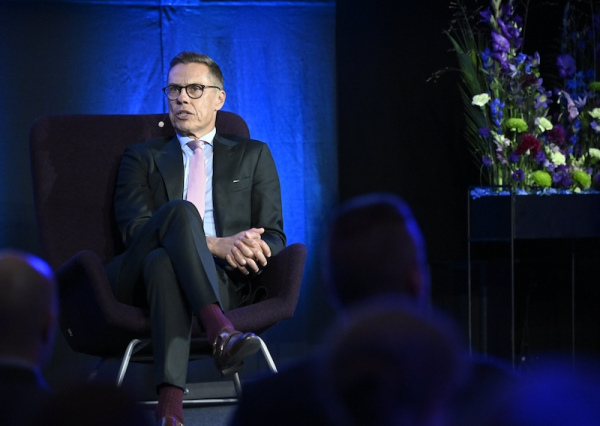Stubb tells The Guardian Europe must be ready to fight Russia under Ukraine security pact

President of the Republic Alexander Stubb took part in the opening session of the Helsinki Security Forum 2025 conference in Helsinki on 19 September 2025. Photo: Heikki Saukkomaa / Lehtikuva
- Next Article Finland to abstain from recognising Palestine at UN despite opposition pressure
President Alexander Stubb of Finland has warned that any future security guarantees for Ukraine must include a clear commitment from European countries to engage militarily if Russia launches renewed aggression.
Speaking ahead of the United Nations General Assembly in New York, Stubb told The Guardian that such guarantees must be backed by real force, calling them “a deterrent” that must be “plausible” and “strong”.
“If they are not backed up with genuine readiness to act, they are meaningless,” he said. “That means a willingness to fight.”
The comments mark a significant departure from the current policy of most Western governments, which have largely avoided any suggestion of direct military confrontation with Russia. Up to now, support for Ukraine has come in the form of weapons, aid, and training, while military engagement has remained off the table.
Stubb said the proposed guarantees would only come into effect following a negotiated settlement between Ukraine and Russia, but stressed that Russia would have “absolutely no say” in the structure or terms of such agreements.
“Russia has no veto over the decisions of sovereign states,” he said.
His remarks follow statements last month from French President Emmanuel Macron, who said that 26 nations had agreed to contribute to a “reassurance force” for Ukraine, with military presence potentially extending to “ground, sea or air”.
Asked directly if that meant European countries would be expected to fight Russia under the agreement, Stubb replied: “That is the idea of security guarantees by definition.”
The Finnish president has positioned himself as a key intermediary in diplomatic efforts around Ukraine, maintaining regular contact with Donald Trump and acting as a go-between for European leaders. He confirmed that a one-on-one meeting with Trump is expected in the coming days.
“We speak regularly by phone and other means,” Stubb said. “It’s the job of the Finnish president to have a functional relationship with whoever holds the office in the United States.”
The security talks take place amid continuing uncertainty about the Trump administration’s long-term posture on Ukraine. Trump has publicly criticised Russian President Vladimir Putin but has also hosted him in Alaska and offered few details on what a final peace deal would require.
Stubb acknowledged that there has been little tangible progress in pushing Putin towards negotiations.
“There’s no sign of a willingness to compromise,” he said. “This war is too big for him to lose. He has failed in all his strategic objectives, but right now I’m pessimistic.”
He added that while Ukraine is willing to negotiate, as stated by President Volodymyr Zelenskyy, Russia has demanded meetings only under conditions Ukraine finds unacceptable, including hosting any talks in Moscow.
Despite the impasse, Stubb believes that groundwork for postwar arrangements must still proceed.
He also reiterated the importance of American involvement in any future security structure, saying an “American backstop” would be essential to ensure credibility.
“You need a United States commitment to make these guarantees real,” he said.
Stubb dismissed concerns that European countries may not have the political will to honour such a defence pledge.
“The political will must exist, or the guarantee is worthless,” he said. “We cannot afford to signal weakness.”
In Kyiv last week, Stubb met with Zelenskyy and said he was confident in Ukraine’s ability to continue the war effort.
“Talk of fatigue is disinformation,” he said. “Ukraine is determined.”
The Finnish leader also expressed concern about recent Russian military activity in Europe, including repeated airspace violations in Estonia, Poland and Romania. While NATO’s Article 5 has not been triggered, the incidents have fuelled fears of a broader confrontation.
Trump reacted to a Russian jet incursion over Estonia last week by warning of potential consequences. “I don’t like when that happens,” he said. “It could be big trouble.”
Stubb said such events underline the urgency of building robust security guarantees. He stressed that Finland’s role, as a small state, is to amplify its influence through diplomacy and coalition-building.
“Foreign policy is built on values, interests, and power,” he said. “Small states have values and interests. Influence is how we compensate for the lack of power. And engagement is always better than disengagement.”
The Finnish president’s statements come at a time when European leaders are navigating how to structure postwar relations with Ukraine while avoiding direct escalation with Moscow. The idea of a coalition-based security pact has gained traction, but the scale of military commitment remains unclear.
As the UN General Assembly opens, Stubb plans to hold talks with other European heads of state and continue discussions with both the US and Ukraine.
Without a clear roadmap for peace, however, the proposal for security guarantees remains largely theoretical.
Still, Stubb insists that ambiguity is not an option.
“If we say we will protect Ukraine, then we must mean it,” he said. “That is what deterrence requires.”
HT
- Next Article Finland to abstain from recognising Palestine at UN despite opposition pressure
Source: www.helsinkitimes.fi
